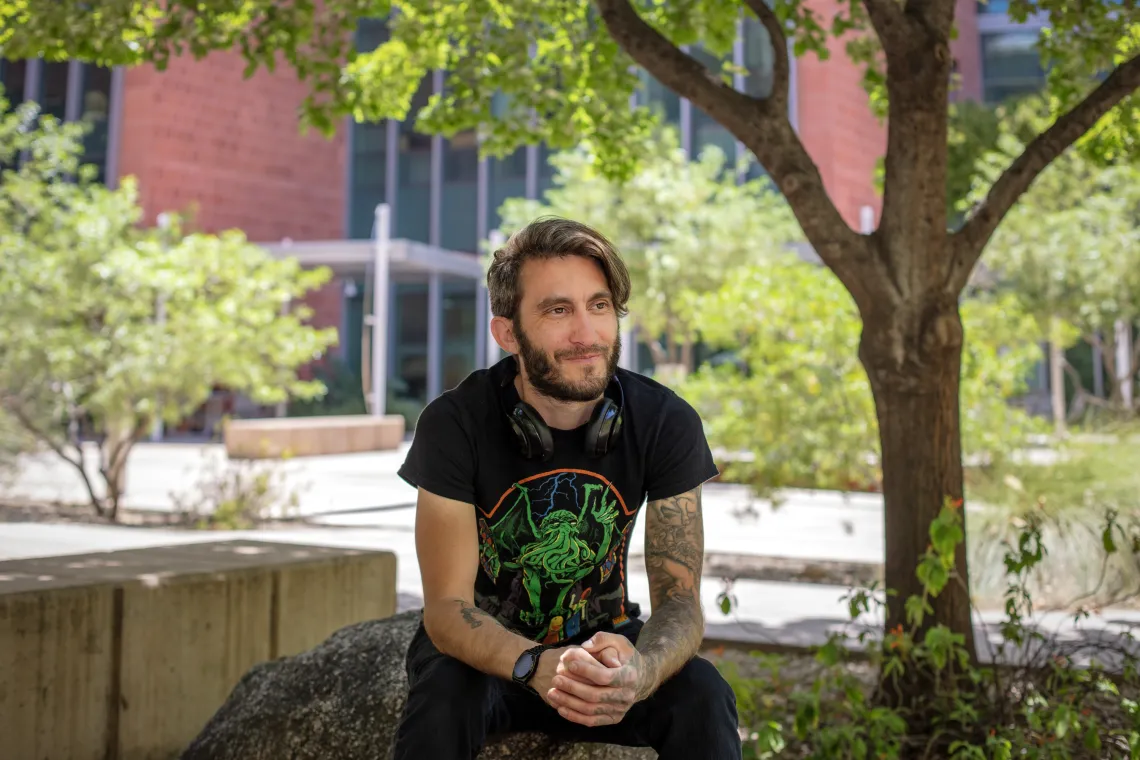Research training grant propels U of A student from sci-fi to real-life virology

T32 trainee Ian Kline
Leslie Hawthorne Klingler, Research Development Services
— Tucson, AZ —
Ian Kline, PhD, has been captivated by science fiction in books, movies and video games since he was a child. “Resident Evil was a game changer for me,” he says. “It’s about a virus, and that really grabbed my attention, but it wasn’t clear to me as to why at the time.” With education, skilled mentors and a training grant gained at the University of Arizona, his early fascination with fictional viruses has grown into a full-fledged career path.
While funding his undergraduate studies in psychology selling motorcycles, Kline took a first-semester science course in molecular biology, which, he says, “blew my mind.” The course sparked a deep curiosity that steered him toward chemistry, physics and mathematics. “I wanted the tools to understand how the universe operated,” he says.. “These provided clarity and mechanism to so much of the natural world around me.” He furthered this interest with a minor in microbiology, including courses in microbial metabolism and immunobiology. Collectively, he says, these experiences forged a desire in him to develop a better understanding of the connection between viral pathogens and their human hosts. Virology research encompassed all of these disciplines.
After enrolling in U of A’s Graduate Program in Molecular Medicine (GPMM), Kline applied for a grant he learned about through a campus email. “I wanted to secure my own funding,” Kline says, “it was important to me that I could put my ideas down on paper, propose something and actually perform the work.”
While Kline’s ambition paid off— he became a 2022-2023 awardee of the Infection and Inflammation as Drivers of Aging (IIDA) T32 Training Grant—it was only after what he calls a “challenging but rewarding learning experience.” He advises trainees to do their due diligence when applying for grants and ask questions. “Grant writing is hard. You’re up against a lot of great competition. You have to really dive into the literature, identify the knowledge gap and then start writing with a focused emphasis.” he says. “I also learned that writing is a somewhat iterative process. If I were to apply for a post-doctoral training grant, I’d approach it with a newfound understanding of this and seek feedback from mentors more frequently.”
Kline’s research in the lab of John Purdy, PhD, focuses on how human cytomegalovirus (HCMV), a common herpesvirus carried by most adults, hijacks and reprograms host cellular metabolism, which may contribute to several age-related conditions. “There’s a lot of unknowns in this area,” he says, “and that’s where my research comes in. We’re trying to turn those unknowns into knowns.”
Kline successfully defended his dissertation, “Genetically Divergent HCMV and SARS-CoV-2 Differentially Reprogram Host Phospholipid Metabolism,” in July 2024. He says though he originally intended to pursue teaching after graduate school, he feels fulfilled in his current work as a scientist. “Completing a PhD requires discovering something novel and contributing to society,” he says.. “I see it as a meaningful way of giving back.”
While he envisions his future in industry, where his basic science research skills can be used to develop antiviral drugs, he also feels passionate about education and outreach. “There’s a part of me that wants to stay connected to people of all ages who are eager and willing to learn,” he says, “even if only through volunteer work.”

